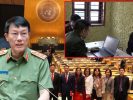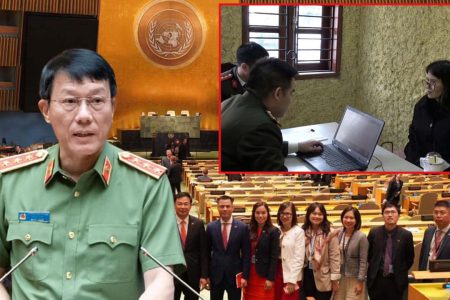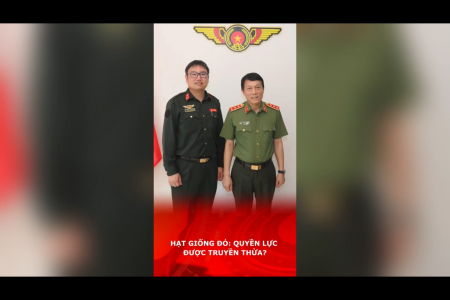On May 27, the US Ambassador to Hanoi hosted an online discussion with special speaker Bonnie Glaser, Asia Senior Advisor and China Power Project Manager at the Center for Strategic and International Studues (CSIS) in Washington DC. The topic of the discussion was „Regional Security and the South China Sea in the COVID-19 pandemic.”
During the discussion, Ms. Glaser asserted that COVID-19 pandemic did not make China change its policy in the East Sea (South China Sea).

The American expert said that China is not acting in a strange way at the moment, it simply sees an opportunity to step up its activities to seek its own interests and this is not the first time. In the past, the country has repeatedly challenged territorial claims when it saw regional and international conditions favorable to it.
„When conditions are favorable, China will move forward,“ Glaser explained. „On the contrary, they will pause and consolidate their positions. After that, they will come again when they see an opportunity.“
According to Ms. Glaser, the construction and militarization of illegal artificial islands hel China maintain a continuous military presence in the South China Sea from which to support the campaign of intimidation and intervention in various activities from regional countries, from fishing to energy exploration.
She also noted that China recently named 25 islands, rocks, reefs and 55 undersea geographical features in the South China Sea and this was the first time since 1983, China had named the entities.
„China once renamed the structures in 1983 and now renames them, which is quite unusual,“ Glaser said. They have prepared it long time ago and announced it now.”
Glaser added that Beijing has two major goals, set by President Xi Jinping at the 19th Party Congress in 2017, with two milestones in 2035 and 2049.

Accordingly, by 2035, China wants to achieve the goal of becoming a socialist state, becoming the world’s leading country in the field of innovation, increasing „soft“ power and completing modernization of its army.
By 2049, the 100th anniversary of the founding of the People’s Republic of China, the official name of China, the most populous country in the world wants to become „a modern and strong socialist country“ having great influence on the international arena and the most powerful army in the world.
Answering the question of the Vietnamese daily newspaper „Will China and the US face a dispute in the South China Sea, at the same time there are events related to Taiwan and Hong Kong?“ Glaser said „China wants to win the US in a dispute in the South China Sea, but does not want a military confrontation.“
„If there is a conflict with the United States, China will suffer a lot and it will be impossible to achieve its national goals, as well as build a national unity,“ she said. “Therefore, China wants to win and does not want to confront. In my opinion, China will continue to use paramilitary forces operating in the South China Sea not to provoke the US to use force.„
That is, China will try not to clash with the US, but to „slowly“ implement its intentions.
Glaser said that if a clash were to occur, there would certainly be a political crisis, but she „did not believe the tension between the two sides would increase“ and „the two sides would not allow the situation to increase.“
On the US side, Glaser said Washington also did not want to have a confrontation with Beijing. The US wants to resolve disputes and disagreements with China peacefully, through dialogue and negotiation.
According to Glaser, for many years, the administration of President Barack Obama and now the administration of President Donald Trump have shown very clearly US policy with the South China Sea, that is to „ensure freedom of navigation and overflight“ in an area under international law.” Accordingly, US forces will „enter into the seas and airspace with the freedom granted by international law.“
Glaser added: “The US policy pays more attention to protecting and strengthening the maritime rights in this area, the legal right to develop energy, to catch seafood in the seas where international law allows, at the same time, states to exercise their rights legally, expressing their voice and rights.“
Glaser said that many US ships and aircraft have come to the South China Sea to show China that „the United States cares about this area and ensures that countries exercise the legal rights in the area„. Glaser, for example, took the example of the US ship passing Malaysia’s oil drilling area operating in the South China Sea, where Chinese vessels harassed it. That is a signal that the US is expressing concern and the US does not want to witness such harassment.
During the discussion, the US expert clearly answered the question of whether Vietnam should and could enhance its comprehensive partnership with the US into a strategic partnership, while always declaring loyalty to itself “4 Nos” policy.
She said: „Vietnam is not the only country that has a policy of ’not linking with one country to fight against the other‘. Many countries around the world have similar policies. Each country must identify itself and follow it. You can establish military relations with one country, and establish comprehensive partnerships with the other, for example with the US, as an example, not against China.“
„Vietnam can allow the US relief force to operate in its home country during a natural disaster, or participate in military exercises with the US. These activities also send signals to China about concerns shared by countries, such as China’s bullying with Vietnam and other countries in exploiting energy in the exclusive economic zone in the South China Sea.“
„Each country needs to find its own ’safe zone‘ to signal that it is not affiliated with one country to combat the other, but can still work with other countries to protect its interests. Given that this has also been seen in practice, through the US sending an aircraft carrier to the port at least twice to Vietnam, Vietnam may consider expanding this activity with the US because that is a strong signal to China that Vietnam still has other options, if Vietnam really wants to influence and change its attitude.“
At the workshop, another question was asked „when will China and ASEAN complete the Code of Conduct (COC) in the South China Sea?“

„I don’t believe China wants to finish this by 2021, but the problem could drag on to 2022. Another objective reason is that Vietnam is currently the rotating chairman of the ASEAN, and many countries hope that Hanoi will promote this, but because of the COVID-19, it is difficult for Vietnam to organize the ASEAN summit and therefore it is difficult to apply diplomatically to complete this set of rules.”
“Meanwhile, ASEAN countries have not yet agreed on this, plus the obstacle of COVID-19. On the Chinese side, they will certainly disagree with other countries outside the region to exploit natural resources.
Moreover, if ASEAN countries feel their sovereignty is not guaranteed, they are unlikely to agree,” added speaker Bonnie Glaser. „Therefore, if there is not a set of codes of conduct worthy of satisfaction, satisfied by all parties, then, it is better not to have such one.“
Ms. Bonnie Glaser assessed that Vietnam becoming ASEAN President and non-permanent member of the UN Security Council in 2020 is a good opportunity to confront China in the South China Sea. However, there are some disadvantages that Vietnam needs to overcome in order to promote its role well because this is the time of COVID-19 pandemic.
She said: “I hope Vietnam will play its role to strengthen ASEAN, to promote some views, and bring the COC dialogue back, to ensure that there are some reactions against some of China’s demands, against some of the languages that China tries to include in the COC may be detrimental to the interests of ASEAN member states.”
Another question that has attracted the attention of public opinion has been posed to American scholars: Beijing wants to influence Vietnam before the 13th Party Congress?

Ms. Bonnie Glaser said she did not analyze the internal politics of Vietnam, but she believed that „China has always wanted, and increasingly tries to influence, the internal politics of other countries.“
„The best example is Australia. We can see that China has been very determined to intervene in its society and politics. In that few years ago, China used the money to build relationships with members of the Australian parliament. In response, Australia has passed a law banning foreign political donations that took effect in early January 2019. That is just one example of countless examples like that.“
„COVID-19 has really shown a renewed Chinese determination to use fake news and foreign policy ‚wolf warriors‘ to accuse other countries. This is really astonishing, it is inherently is not what we used to see in the past. China has made great efforts to spread fake news such as who created the virus, who initiated it, even to the point where they spread the news that France left the people dead in the hospital. They somehow think that this information is in their interest.“
„Therefore, we are seeing more innovative ways of China in its efforts to intervene within Vietnam’s politics, possibly through media, through Facebook, Twitter … Vietnam should anticipate what China can do, and try to build barriers in any field possible to ensure that the political system is strong, enduring, and not vulnerable to Chinese political interventions.“
Thoibao.de (Translated)


























